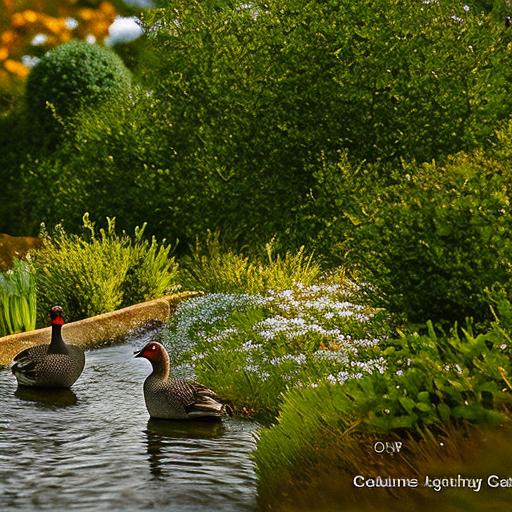Geese can be a beautiful addition to any garden, but they can also be a nuisance. They can cause damage to plants, leave behind droppings that are unsightly and unsanitary, and even become aggressive towards humans or other animals. Fortunately, there are several methods available to deter geese from gardens. In this article, we will explore different strategies to keep geese out of your garden and maintain a peaceful coexistence.
Key Takeaways
- Geese are attracted to gardens because of the availability of food and water.
- Physical barriers such as fences and netting can be effective in keeping geese out of gardens.
- Decoys and deterrents like scarecrows and reflective tape can be used to scare geese away.
- Planting goose-resistant vegetation like tall grasses and prickly shrubs can discourage geese from entering the garden.
- Creating alternative feeding areas like bird feeders can divert geese away from the garden.
Understanding the behavior of geese in gardens
Geese are attracted to gardens for several reasons. First, gardens often provide a source of food for them. They are herbivores and will eat grass, plants, and even vegetables if given the opportunity. Second, gardens often provide a safe and comfortable environment for geese. They offer open spaces for grazing and nesting, as well as water sources such as ponds or birdbaths.
When geese enter a garden, they can cause significant damage. They will trample on plants, eat foliage, and leave behind droppings that can be difficult to clean up. Geese are also known to be territorial and may become aggressive towards humans or other animals if they feel threatened.
Installing physical barriers to keep geese out
One effective method to deter geese from gardens is by installing physical barriers. There are several types of physical barriers available, including fences, netting, and scare tape.
Fences can be an effective way to keep geese out of your garden. They should be at least three feet high and made of materials that are difficult for geese to climb or fly over. Netting can also be used to cover plants or ponds, preventing geese from accessing them. Scare tape is another option that can be hung around the perimeter of the garden. The reflective material scares geese away by creating movement and noise in the wind.
When installing physical barriers, it is important to ensure they are secure and properly maintained. Check for any gaps or holes that geese could squeeze through, and repair them promptly. Regularly inspect the barriers to make sure they are still effective and replace any damaged or worn-out materials.
Using decoys and deterrents to scare geese away
Another method to deter geese from gardens is by using decoys and deterrents. Decoys are objects that resemble predators or other animals that geese are afraid of, such as dogs or owls. Placing these decoys in the garden can create the illusion of danger and scare geese away.
There are also several deterrents available that can be used to repel geese. These include motion-activated sprinklers, noise-making devices, and laser lights. Motion-activated sprinklers release a burst of water when they detect movement, scaring geese away. Noise-making devices emit loud sounds that can startle geese and make them uncomfortable. Laser lights create a moving beam of light that can be disorienting for geese.
When using decoys and deterrents, it is important to move them around regularly. Geese can become accustomed to their presence if they remain in the same location for too long. By moving them around, you can maintain their effectiveness and keep geese on their toes.
Planting goose-resistant vegetation in the garden
One way to deter geese from gardens is by planting vegetation that they do not like to eat. There are several types of plants that geese tend to avoid, including ornamental grasses, prickly shrubs, and plants with strong scents.
Ornamental grasses, such as fountain grass or switchgrass, can be a great addition to a garden as they provide texture and movement. Geese tend to avoid these grasses because their blades are sharp and uncomfortable to eat.
Prickly shrubs, such as holly or barberry, can also be effective in deterring geese. The thorns on these shrubs make them unappealing for geese to eat or nest in.
Plants with strong scents, such as lavender or rosemary, can also help deter geese. Geese have a sensitive sense of smell and are often put off by strong odors. Planting these types of plants around the perimeter of the garden can create a barrier that geese are reluctant to cross.
When planting goose-resistant vegetation, it is important to consider the specific needs of the plants. Make sure they are suitable for your climate and soil conditions, and provide them with proper care and maintenance to ensure their health and longevity.
Creating alternative feeding areas for geese

Creating alternative feeding areas for geese can help divert their attention away from your garden. By providing them with an alternative food source, you can reduce their desire to enter your garden.
One way to create alternative feeding areas is by planting a separate area of grass or vegetation specifically for the geese. This can be done in a corner of the garden or in a nearby open space. By providing them with a designated area to graze, you can minimize their impact on your garden.
Another option is to install a bird feeder or birdhouse that is specifically designed for geese. These feeders can be filled with grains or seeds that are appealing to geese, providing them with a food source that is separate from your garden.
When creating alternative feeding areas, it is important to regularly monitor and maintain them. Ensure that they are well-stocked with food and water, and clean up any spilled or leftover food promptly to prevent attracting other pests.
Implementing noise and light-based deterrents
Noise and light-based deterrents can be effective in scaring geese away from gardens. There are several types of noise and light-based deterrents available, including ultrasonic devices, wind chimes, and strobe lights.
Ultrasonic devices emit high-frequency sounds that are unpleasant for geese. These devices can be placed in the garden and set to activate when geese are detected. The high-frequency sounds will startle geese and make them uncomfortable, encouraging them to leave the area.
Wind chimes can also be effective in deterring geese. The sound of the chimes can create a sense of movement and noise that geese find unsettling. Hang wind chimes around the perimeter of the garden or in areas where geese are known to frequent.
Strobe lights can be used to create a disorienting effect for geese. The flashing lights can startle them and make them uncomfortable. Install strobe lights around the garden or in areas where geese are known to gather.
When using noise and light-based deterrents, it is important to consider the specific needs of your garden and the surrounding environment. Some noise or light-based deterrents may not be suitable for all situations, so it is important to choose ones that are appropriate for your needs.
Using scent-based repellents to keep geese away
Scent-based repellents can be an effective way to deter geese from gardens. There are several types of scent-based repellents available, including predator urine, citrus sprays, and garlic-based solutions.
Predator urine, such as coyote or fox urine, can be sprayed around the perimeter of the garden to create the illusion of danger. Geese are naturally wary of predators and will avoid areas that smell like them.
Citrus sprays can also be effective in deterring geese. The strong scent of citrus is unpleasant for geese and will discourage them from entering the garden. Spray citrus-based repellents on plants or other areas where geese are known to gather.
Garlic-based solutions can also be used to repel geese. The strong smell of garlic is unappealing to geese and will discourage them from entering the garden. Mix garlic juice or crushed garlic with water and spray it around the perimeter of the garden.
When using scent-based repellents, it is important to reapply them regularly. The scent can fade over time, especially in outdoor environments, so it is important to refresh the repellents as needed.
Adopting humane methods to deter geese from the garden
It is important to adopt humane methods when deterring geese from gardens. While it may be tempting to use aggressive or harmful tactics, it is essential to prioritize the well-being and safety of both humans and animals.
Humane methods include using deterrents that startle or scare geese without causing them harm. These can include noise-making devices, motion-activated sprinklers, or decoys that resemble predators. By using these methods, you can encourage geese to leave the garden without causing them unnecessary stress or harm.
It is also important to avoid using harmful chemicals or substances that could be toxic to geese or other wildlife. Choose natural and environmentally-friendly deterrents whenever possible.
Seeking professional help to manage geese in the garden
In some cases, it may be necessary to seek professional help to manage geese in the garden. This is especially true if the problem persists despite your best efforts or if the geese are causing significant damage or posing a threat to safety.
Professional wildlife management companies can provide expert advice and assistance in dealing with geese. They have specialized knowledge and experience in managing wildlife and can offer effective solutions tailored to your specific situation.
To find a professional wildlife management company, you can start by asking for recommendations from local gardening or landscaping organizations. You can also search online directories or contact your local animal control agency for referrals.
Monitoring and maintaining the garden to prevent geese from returning
Once you have successfully deterred geese from your garden, it is important to continue monitoring and maintaining the garden to prevent them from returning. Geese are persistent creatures and may attempt to return to the garden if they find it appealing.
Regularly inspect the physical barriers, decoys, and deterrents to ensure they are still effective. Replace any damaged or worn-out materials promptly. Move decoys and deterrents around regularly to maintain their effectiveness.
Monitor the garden for any signs of geese, such as droppings or trampled plants. If you notice any activity, take immediate action to deter the geese and reinforce the deterrents.
Maintain the garden by regularly removing fallen leaves, grass clippings, or other debris that can attract geese. Keep the garden clean and tidy to discourage geese from entering.
In conclusion, there are several methods available to deter geese from gardens. These include installing physical barriers, using decoys and deterrents, planting goose-resistant vegetation, creating alternative feeding areas, implementing noise and light-based deterrents, using scent-based repellents, adopting humane methods, seeking professional help when needed, and monitoring and maintaining the garden.
It is important to try different methods and find what works best for your specific situation. Geese can be persistent creatures, but with patience and perseverance, you can create a garden that is free from their presence. By implementing these strategies, you can maintain a beautiful and peaceful garden that is enjoyable for both humans and wildlife.
If you’re struggling to keep geese out of your garden, you might find this article on poultrywizard.com helpful. It provides valuable insights on how many eggs geese lay and offers tips on breeding geese effectively. Understanding their breeding patterns can help you devise strategies to deter them from invading your garden. Check out the article here for more information. Additionally, if you’re interested in learning about when guinea fowl lay eggs or are looking for a reliable chicken coop, poultrywizard.com has articles on those topics as well.
FAQs
What are some common methods for keeping geese out of a garden?
Some common methods for keeping geese out of a garden include using physical barriers such as fences or netting, using decoys or scare tactics, and planting certain types of vegetation that geese do not like.
What types of fences or netting are effective for keeping geese out of a garden?
Fences or netting that are at least 4 feet tall and have small openings (less than 2 inches) are effective for keeping geese out of a garden. Electric fences can also be effective, but should only be used by experienced individuals.
What are some effective scare tactics for keeping geese out of a garden?
Effective scare tactics for keeping geese out of a garden include using decoys such as fake predators or reflective tape, using noise makers such as air horns or banging pots and pans, and using motion-activated sprinklers.
What types of vegetation do geese not like?
Geese do not like certain types of vegetation such as plants with prickly leaves or stems, plants with strong odors, and plants with bitter or sour tastes. Examples include thorny bushes, herbs like rosemary or lavender, and vegetables like kale or rhubarb.
Are there any legal restrictions on keeping geese out of a garden?
There are no legal restrictions on keeping geese out of a garden, as long as the methods used are humane and do not harm the geese. It is important to check with local authorities regarding any specific regulations or permits that may be required.
Meet Walter, the feathered-friend fanatic of Florida! Nestled in the sunshine state, Walter struts through life with his feathered companions, clucking his way to happiness. With a coop that’s fancier than a five-star hotel, he’s the Don Juan of the chicken world. When he’s not teaching his hens to do the cha-cha, you’ll find him in a heated debate with his prized rooster, Sir Clucks-a-Lot. Walter’s poultry passion is no yolk; he’s the sunny-side-up guy you never knew you needed in your flock of friends!







